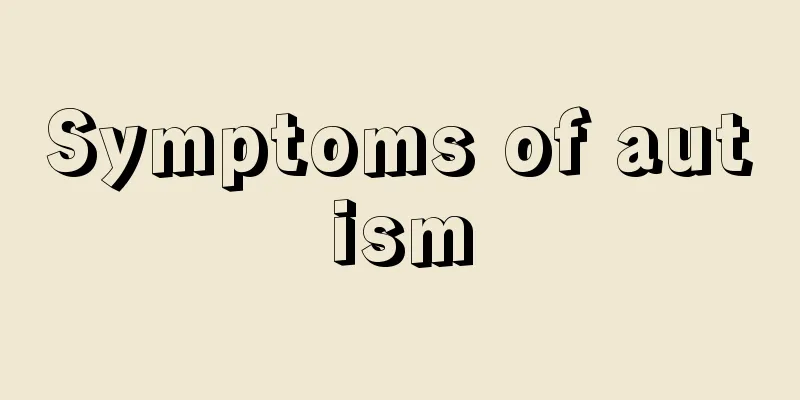The 40-day-old baby keeps farting

|
Newborns are prone to farting after birth, and we often hear the baby's stomach gurgling. This is because the baby's gastrointestinal function is not fully developed at this stage, and the baby generally only eats breast milk or formula, which are liquid foods. This kind of food is particularly easy to digest and absorb, which will cause the baby to fart a lot. So what should I do if my 40-day-old baby is always farting? It is normal for newborns to fart a lot. Farting a lot is very common in infancy. Newborns who are just a dozen days old and have been breastfed may sometimes come out with a little poop when they fart, and their stomachs often make gurgling sounds. The gastrointestinal tract of infants is immature, which causes uncoordinated intestinal motility at different stages of the baby's life and causes intestinal bloating - gurgling sounds in the stomach, frequent gas and farting, and frequent unexplained crying. This phenomenon is medically known as infantile colic. Infant colic refers to a healthy, well-nourished baby who cries for at least three hours a day, at least three days a week, for more than three weeks. Most babies start to show symptoms 2 to 3 weeks after birth and gradually improve after 3 to 4 months. Since infant colic is a problem in the baby's development, parents do not need to worry and should understand that this kind of crying by the baby is not a disease. At the same time, keep the baby in a comfortable position as much as possible to help the child defecate smoothly. If the situation is more serious, you can take some drugs to improve gastrointestinal motility. For infant colic that is difficult to relieve, parents should consider whether it is an allergy to milk protein. They can reduce the amount of milk or dilute the milk appropriately. For children who are suffering from diarrhea, taking probiotic powders such as Mommy Love or Biostime can shorten the course of diarrhea and regulate their own gastrointestinal system. Secondly, these kinds of "weird farts" reveal health problems 1. Fart a lot The baby may inhale too much air during the process of sucking milk, which is an important reason for the baby to fart a lot. At the same time, because the gastrointestinal tract of infants is immature, the intestinal motility of infants at different stages is not coordinated, causing intestinal bloating, which will cause gurgling sounds in the stomach. The more gas you expel, the more farts you will naturally produce. 2. Farting with poop This situation is more common in breastfed babies and less common in formula-fed babies. This is mainly diarrhea caused by breastfeeding (i.e. breast milk diarrhea), because the prostaglandin content in breast milk is high, which promotes the movement of small intestinal smooth muscles, increases the secretion of water and electrolytes, and produces loose stools. Therefore, breastfed babies have more and thinner stools, and their farts will bring out stools. Mothers do not need to be surprised by this. 3. Fart odor This may very well be a precursor to defecation. There is a saying that goes: wind is at the head of rain, and fart is at the head of shit. When the baby has difficulty defecating, intestinal motility increases, which will expel the gas in the intestine, usually in the form of smelly farts. After the feces are expelled, the baby will no longer fart smelly. If your baby farts frequently, smells sour, and burps constantly, it may be due to excessive intake of fat and protein recently, causing indigestion. 4. Empty Fart The baby farts intermittently, but without any odor, accompanied by bursts of bowel sounds. This is mostly caused by increased intestinal motility due to hunger after the gastrointestinal tract is empty. At this time, you should feed it in time. So, farting may also be related to being hungry. Finally, how to adjust the diet to make your baby’s stomach and intestines healthier? 1. Eat small, frequent meals For babies under 18 months old, two snacks can be added to the three meals, in the afternoon and evening. After 18 months old, change the two snacks out of three meals to one snack in the afternoon. Mothers need to pay attention that adding complementary foods to babies should be appropriate and not too much. The time should not be too close to the main meal time, otherwise it will affect the appetite for the main meal. 2. Eat more fruits and vegetables Vegetables are one of the main sources of nutrition for the baby. If the baby doesn’t like to eat vegetables, the mother can grind the vegetables into minced vegetables and mix it with rice to feed the baby. In addition, eat more fruits. 3. Eat an appropriate amount of animal and plant protein Meat, fish, beans and eggs contain a lot of high-quality protein. Mothers can use these foods to make soup, or feed their babies with easily digestible foods such as minced meat, fish balls, tofu, and egg custard. |
<<: What should I do if my child has a fever after eating too much?
>>: How to tell if your baby is bloating
Recommend
What are the benefits of drinking honey water for children?
In life, many children like to drink honey. Honey...
What should I do if my child’s hand is dislocated? Introducing the correct solution
If a child's hand is dislocated, it will defi...
What should children eat to get better quickly if they have dampness?
Excessive moisture has a great impact on the body...
Can rule out biliary atresia
Newborn babies will have jaundice three or four d...
What to do if your baby's tooth is broken
Children are very naughty when running and jumpin...
What is the cause of juvenile granulosa cell tumor?
Once it is related to tumors, it is considered ba...
What to do if the child keeps crying
It is very normal for children to cry in life. Bu...
What should I do if my baby has a high fever and bacterial infection?
After a baby is infected with bacteria, he or she...
Is it useful to soak your child's feet when he has a fever?
As children grow up, they are prone to fever beca...
What to do if your baby's temperature fluctuates
When babies are young, their constitutions are re...
Why are the palms and soles of the baby hot?
Children's health problems are what parents w...
Baby's lips are dry_baby's lips are dry_what to do if the baby's mouth is dry and peeling
Now more and more parents are beginning to pay mo...
How to make your baby talk early
It is a surprise to parents when their baby start...
Why do children have neck pain?
This season is when children are prone to allergi...
What are the symptoms of mycoplasma infection in children
Mycoplasma is extremely harmful to human health, ...









